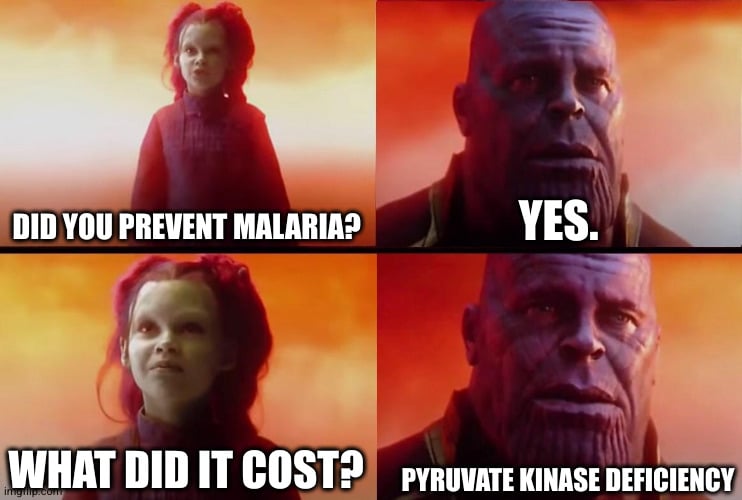Life hack: sickle cell patients get all the narcotics they want in the hospital
Science Memes
Welcome to c/science_memes @ Mander.xyz!
A place for majestic STEMLORD peacocking, as well as memes about the realities of working in a lab.

Rules
- Don't throw mud. Behave like an intellectual and remember the human.
- Keep it rooted (on topic).
- No spam.
- Infographics welcome, get schooled.
This is a science community. We use the Dawkins definition of meme.
Research Committee
Other Mander Communities
Science and Research
Biology and Life Sciences
- [email protected]
- [email protected]
- [email protected]
- [email protected]
- [email protected]
- [email protected]
- [email protected]
- [email protected]
- [email protected]
- [email protected]
- [email protected]
- [email protected]
- [email protected]
- [email protected]
- [email protected]
- [email protected]
- [email protected]
- [email protected]
- [email protected]
- [email protected]
- [email protected]
- [email protected]
- [email protected]
- [email protected]
- !reptiles and [email protected]
Physical Sciences
- [email protected]
- [email protected]
- [email protected]
- [email protected]
- [email protected]
- [email protected]
- [email protected]
- [email protected]
- [email protected]
Humanities and Social Sciences
Practical and Applied Sciences
- !exercise-and [email protected]
- [email protected]
- !self [email protected]
- [email protected]
- [email protected]
- [email protected]
Memes
Miscellaneous
ELI5
There is a small wormy parasite (Plasmodium falciparum) that attacks our red blood cells (RBCs).
It turns out that people with mutant and half-mutant RBCs are less likely to be attacked by the parasite.
Also, the RBCs of the mutant variety are more likely to be cleared by white blood cells than those that are non-mutants.
Full-blown (homozygous) mutant RBCs kinda suck at their day jobs though. Whereas half-mutant (heterzygous) RBCs are still mostly functional by comparison.
So being a little weird, but not totally weird, gives an advantage over normies (wild-type) when the RBC parasite is common.
Were there no parasite around, the advantage would go to the non-mutant RBCs because they do their job best. Their downside is being easy targets.
Basically this mutation is shown to protect against malaria, but it causes an issue with producing a molecule needed for the creation of ATP (energy your body needs)
So while they can offer a protective effect to the subject they could need transfusions or other treatment to stay healthy.
Subject 1 & 2 had similar biomarkers, and subject 3 had different markers causing a type of misread that made them transfusion dependent.
That’s my understanding at least
For those who don't know there are two main pathways in which the cell produces energy and precursors. Glycolysis and TCA cycle. And the pyruvate kinase (PK) is one of the last steps of glycolysis. Glycolysis functioning is imperative for rapid energy production from glucose, and that's why we love sugar (e.g. glucose). I.e. I don't think this deficiency is overall a great solution 🫣
